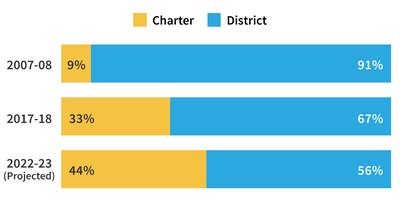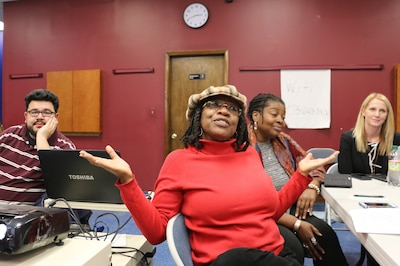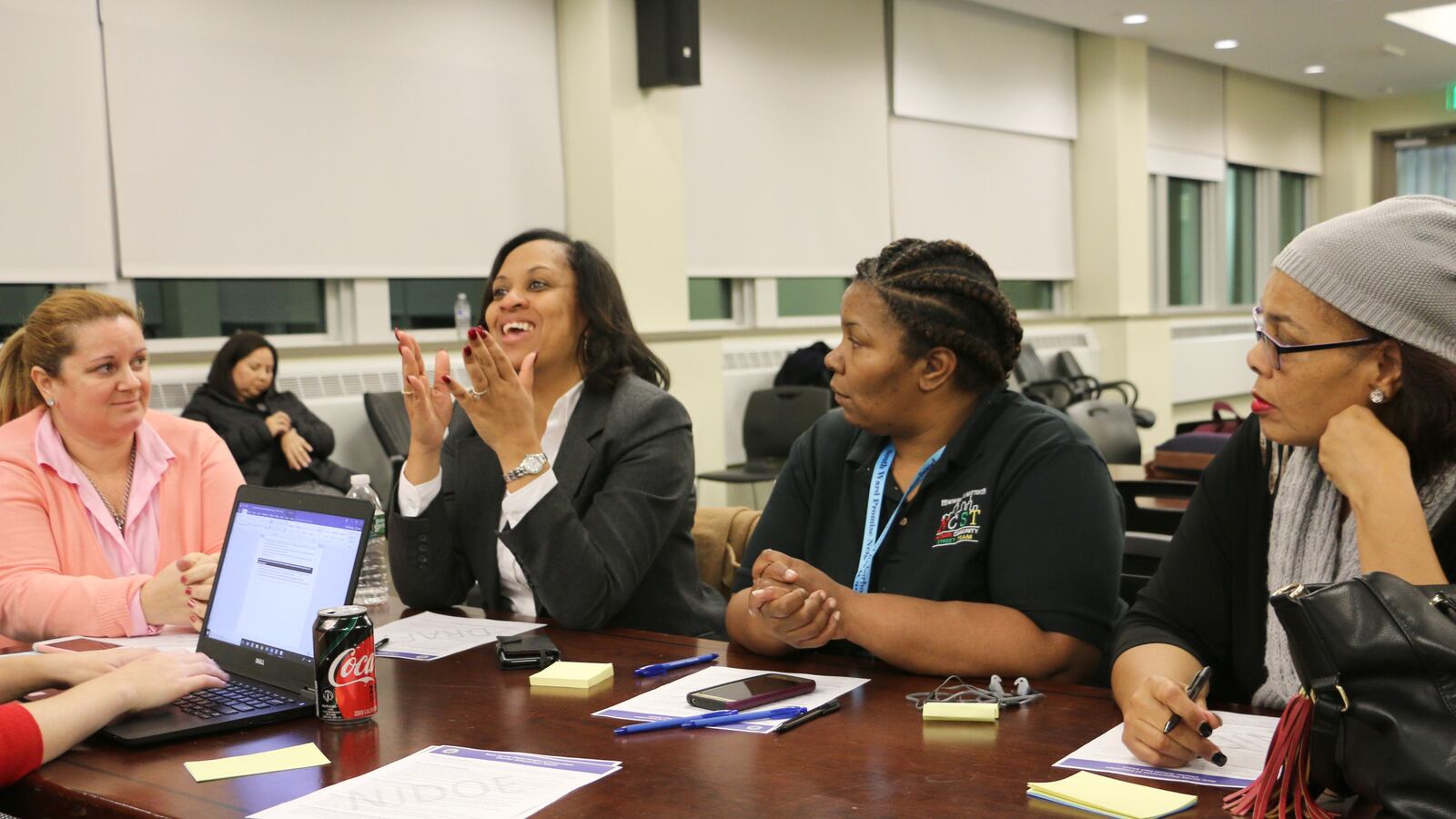Newark residents had a chance this week to sound off on charter schools, which remain a lightning rod in the city even as they educate more than one in three Newark students.
As part of a statewide charter school “listening tour,” the state education department hosted a public forum Monday in Newark, where nearly 18,900 students attend charters — making Newark the charter capital of the state. Yet of 90 registered attendees, only six people showed up.
“I enjoyed this,” said Denise Cole, an advocate for Newark’s traditional schools, near the end of the 80-minute meeting. But, she added, “If we wouldn’t have come, y’all wouldn’t have had nobody here.”
The unusually low turnout soon sparked rumors that some unnamed entity had packed the guest list to block others from attending. Both charter critics and supporters said they were unable to register because the sign-up list quickly reached capacity. (A state spokeswoman said Tuesday that unregistered guests would not have been turned away, though it appears not many people knew that.)
The kerfuffle could be seen as a microcosm of the charter-school debate in Newark, where reliable information can be elusive and deeply held convictions are often paired with deep suspicions.
It also added to the uncertainty surrounding the state’s charter tour. The education department announced the campaign last month as a way to gather feedback on the publicly funded, privately operated schools that educate just over 3 percent of New Jersey students but roughly 35 percent in Newark. The tour has included schools visits, invite-only focus groups, and public forums like the one Monday.
It comes amid a “comprehensive review” of the department’s charter-school policies ordered by Gov. Phil Murphy, who has been far more ambivalent about the schools than his charter-friendly predecessor, Chris Christie. Murphy has floated a pause on approving new charter schools during the review, which prompted fears of a “stealth moratorium” this year after Education Commissioner Lamont Repollet rejected every application to open new charters schools except one. Repollet has denied that a moratorium is in place, but said he plans to “modernize and change” the state’s more than 20-year-old charter rules.
The vague messages out of Trenton have given advocates on both sides of the charter debate hope that their input during the listening tour might help convince the state to take either a friendlier or tougher stance toward the sector. Yet, on Monday, officials were reluctant to say whether the feedback they were gathering would have any impact on their policy review.
“We’re just getting feedback, period,” said Carmen Cusido, director of the education department’s public affairs office. The agency expects to release a report in early 2019 summarizing the responses to its questions about how the state oversees charter schools. The public can also submit comments online.
In addition to Monday’s forum, officials visited People’s Prep Charter School and held focus groups in Newark hosted by the Newark Teachers Union, which has opposed the charter sector, and several groups that represent it, including the New Jersey Charter School Association, the Newark Charter School Fund and North Star Academy Charter School. Those sessions were open only to guests invited by the host organizations.
At the union’s meeting and Monday’s forum, as well as in interviews with advocates, several themes emerged. They point to still-simmering debates about Newark charter schools that are unlikely to be resolved any time soon.
Expansion — should the charter sector keep growing?
Newark’s charter-school sector has ballooned over the past decade.
Since 2008, the share of students who attend charters in Newark has nearly quadrupled — from 9 percent in 2008 to about 35 percent today. By 2023, that number could swell to 44 percent, according to one estimate, as the city’s charters continue to fill seats that were preapproved by the Christie administration.

The exodus of students has forced the district to slash services and close schools, even as its enrollment has started to rebound in recent years. Alarmed by the charter sector’s head-spinning expansion, critics point out that charter funding flows out of the district’s budget — but only the state has the authority to allow new charters or close existing ones.
“We ought to keep in mind that the original purpose of charter schools was never to create a parallel public education system that was somehow immune to oversight by local communities,” said Steve Baker, communications director for the New Jersey Education Association, the state’s largest teachers union.
While some NJEA members work in charters, most are not unionized. The NJEA has called for a suspension of approvals for new charters until the state completes its policy review. And Newark Mayor Ras Baraka has called for a more lasting moratorium, saying the sector’s continued growth would “suck the life out of traditional schools.”
The state considers charter schools’ academics, finances, and organization when deciding whether to close them — a step the state has taken in Newark several times in recent years — or let them grow. Schools can ask for additional seats during their re-authorization process every five years, or in a separate expansion request. The deadline to make that request is Dec. 1.
“That’s going to be a really important decision point for the department,” said Harry Lee, interim president of the New Jersey Charter Schools Association, or NJCSA. “We want to make sure high-quality schools can grow.”
Performance — what have charters achieved?
Newark has one of the top-performing charter sectors in the nation.
An oft-cited 2015 study out of Stanford University found that Newark charter students, on average, made greater annual gains in math and reading than their district-school counterparts — and by a wider margin than charter students in any other major city except Boston.

The sector continued its streak on this year’s state PARCC exams. About 60 percent of charter students in grades three to eight passed the 2018 reading tests, compared to 35 percent of district students, according to an analysis by NJCSA. In math, 48 percent of charter students were proficient versus 26 percent of district students who were. And for the first time, Newark charter students bested the statewide average in both subjects.
“In the second highest-performing state in the country, that’s insane,” said Ryan Hill, founder and CEO of KIPP New Jersey, which oversees eight Newark charter schools.
However, not all charters excelled. At least five of the city’s 19 charter operators had schools that scored below the district average. And the city’s district-run magnet schools, which admit students based on prior academic achievement, outperformed charter schools on average on the high-school English exam.
Critics are also quick to point out that the district serves slightly more students with disabilities than the charter sector and far more students who are still learning English. In 2017-18, just 1 percent of charter students had limited English proficiency, compared to nearly 13 percent of district students.
“There should be a more level playing field,” said Tina Taylor, president of the union representing principals and other administrators in district schools.
Funding — do charters get too much money or not enough?
The battle over charter schools often boils down to resources. In a state where charter funding comes out of district budgets, a boost for charter schools can feel like a loss for traditional schools.
“Money is the real issue,” said James Harris, president of the New Jersey Association of Black Educators and a graduate of Newark’s former South Side High School.
Last school year, the district expected to transfer about a quarter of its budget, or $237 million, to charter schools — up from just $60 million in the 2008-09 school year. This year, the Murphy administration added $37.5 million to the district’s budget. But that may not be enough to stave off future cuts if more students decamp for charters, carrying their per-pupil dollars with them.
Meanwhile, charter advocates are clamoring for more funding. Because charter schools are ineligible for certain types of state aid, they receive on average just 73 percent of per-pupil dollars rather than the 90 percent they are entitled to under state law, according to the New Jersey Charter Schools Association. Charter schools, unlike traditional districts, also do not get state money to pay for facilities.
However, some large charter operators also raise millions of dollars from private donors. One such operator, North Star Academy, says it uses private money for expanding schools but only public funds after they are fully grown.
Critics complain that it can be difficult to track the flow of money through charters.
As the charter debate drags on, people on both sides say they are eager for ways to work together. At the end of Monday’s forum, Denise Cole, the traditional-school supporter, suggested forming a consortium where charter and district schools could exchange ideas.
“We can come together and compromise,” she said, “so that, in Newark, we have schools that all of our children are succeeding at.”

